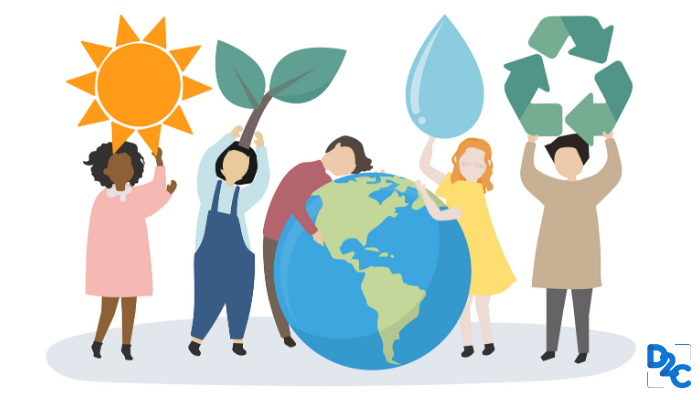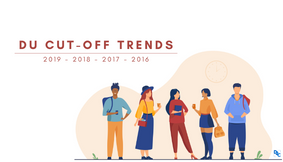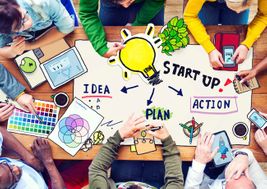Here is what B-Schoolers are doing to tackle climate change | Akshat from NITIE Mumbai

Climate change is real, so you must have heard from the people around you. But this fact is now proven. Aiding to this statement are numerous observable effects on the environment. The melting of glaciers and ice, disrupting of flora and fauna, rising temperatures, are all examples of climate change that is not so sudden but is clearly evident. But the question remains - what can we do to tackle the predicament caused by climate change?
Should we wait for the politicians to act and hope that they'll make the right decisions before it's too late? We’ve seen how waiting certainly hasn't proved to be a potent solution, with words so far being followed with little - if any - convincing action. So, it's more important than ever to take matters into our own hands.
Believe it or not, the greatest threat faced by the current generation is that of climate change. And while the IPCC has stated that the extent of the effects of climate change will vary over time and place, it is crucial to act before it gets too late. Because without a habitable earth to live on, what do we have left?
Many people feel that the issue of climate change is just too broad for an individual to make a difference. But is that really the case? The good news: We are not alone. People, communities, cities, businesses, schools, faith groups and other organizations are also taking relative actions.
So, let us all step up and take necessary actions that help in tackling this burning issue of Climate Change. You, as an individual, can take the following steps to tackle climate change:
Reduce Vehicle Emissions
Make less use of your personal vehicle, whenever possible. Adopt the use of sustainable transportation like bicycles. You can also use public transport or carpool services.
According to the CE, around 2.5 kilos of CO2 is emitted into the atmosphere with every litre of fuel that is used by your car. So, the first step for contributing to a clean environment is to minimize the use of private vehicles and switch to sustainable practices.
Avoid Plastic
Plastic is the all-around quintessential material and is therefore present in pretty much every aspect of our lives. But where the durability of the material acts as a boon, it is also its major disadvantage: we're struggling to get rid of it.
Plastic has found its way in every walk of life - on streets, in rivers, on the beach, in cosmetics, in wastewater, in our clothing, even in the air we breathe. And there's also a close connection between climate change and the global plastic problem.
Produced from fossil fuels, in every single phase of its life cycle, plastic emits greenhouse gases. So, the second step is to use alternatives that are available and avoid Plastic as much as possible to tackle climate change.
Reduce your digital footprint
Every search query we type, every song we stream, and every email we send or receive causes CO2 emissions. Why? Because energy is needed for all the data we’re producing – and it seriously is a lot!
By 2018, the use of digital technologies has outstripped even the aviation industry in terms of CO2 emissions. It's time to tackle the root of the problem of climate change. Let's start with the number one power-guzzler in the digital world: streaming video services.
In order to cater to our screens on-demand, streaming video services platforms need a lot of bits and bytes. Only Netflix currently consumes 15 per cent of the world's internet bandwidth. So, maybe try downloading the content you would like to watch instead of streaming it every time you want to watch it.
Switching to a "green" search engine such as Ecosia that plants trees can also be helpful from a personal point of view. Avoiding the purchase of electronic devices that aren’t essential, and even just cleaning up your email inbox can also work wonders on an individual level.
Invest in Renewable and Divest from Fossil Fuel
One can be a part of the clean-energy economy even if they can’t install solar panels or a wind turbine. You can also look for local renewable energy co-ops and join them.
As a member, a person can own a part of the co-op’s renewable energy projects and will receive a return on the investment. They can also speak to their financial adviser about clean energy/technology investments.
Also make sure that your workplace or university refrains from investing in fossil fuels. You can politely talk to them about the repercussions of its usage on the environment.
Eat a Low Carbon diet
A low-carbon diet results in smarter utilization, in the following ways:
Reduce meat consumption: Livestock is one of the biggest adulterators of the atmosphere. Hence, increase your consumption of fruits and vegetables instead of meat.
Eat seasonal food: Read labels and try eating food that is produced in and around your area. Avoid consuming imported food which leads to more emissions due to transportation. Also, eat seasonal fruits and vegetables, to avoid less sustainable making methods.
Put the 3 R's of sustainability into practice
Reduce: Turn to smart consumptions of utilities. Try using products efficiently.
Reuse: There is a big secondhand market that gives new life to items that you don't use anymore. You can also find something that someone else has gotten rid of, that might be of use to you. This helps in saving money and reducing consumption. Bartering is also a practical solution.
Recycle: You can save around 730 kilos of CO2 every year just by recycling half of the garbage produced at home. So, indulge in recycling practices. This will help in reducing your contributions to climate change.
Whether you are a President of a powerful nation or a simple common man, climate change will have an impact on your life. And vice versa is true too: your actions will directly or indirectly influence the planet for the many decades to come. So, make informed decisions and engage in sustainable practices to save our planet earth. Get ready to make a difference! All the best.
This article was submitted as an entry to Become an Author 2.0 with Dare2Compete.
Login to continue reading
And access exclusive content, personalized recommendations, and career-boosting opportunities.















Comments
Add comment